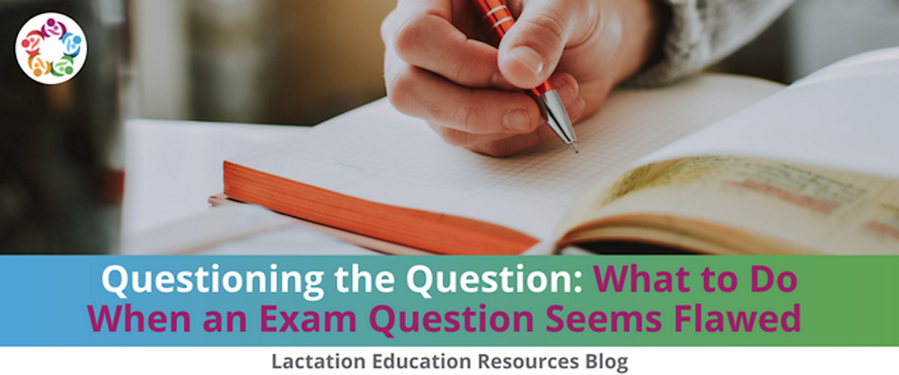Featured
Questioning the Question: What to do when an exam question seems flawed

It’s an anxiety-provoking scenario.
You’re in the IBCLC exam, and you read a question.
You feel completely certain that there is a problem with this question–there is not enough information to answer it correctly, or the right answer is not among the choices … or more than one answer could be right.
Suddenly, you are not sure how to answer it. You’re sure the question has a flaw.
What do you do?
LER’s Program Director Angela Love-Zaranka, BA, IBCLC, RLC, has been a member of the committee that creates the exam.
Below, she shares a game plan for what to do when you think the question is wrong.
1) Don’t panic.
Take a deep breath.
Prepare to look at the question critically.
It may be that there is a problem with the question.
The problem may be in how you’re looking at it.
Either way, it is going to be okay.
2) Look again … and assume it makes sense.
Problems with questions are not impossible, but if you think you’ve found one, it’s definitely best to ask yourself whether the issue might be in your interpretation.
Every question on the IBCLC exam was created by a clinician in the field and vetted by other clinicians in the field from around the world.
If you’re encountering it on the exam, the question has been through an arduous multi-step process.
First, it was written and reviewed.
Then, it was vetted by IBLCE’s Exam Development Subcommittee, which asks: Is there enough information in the question to provide the right answer?
Then, it was translated into the exam’s 17 languages … and then it was back translated to ensure nothing was lost.
So, why might the question seem flawed to you?
Remember that you’re taking an international exam.
Is the lens of your own particular setting and experience shaping your view of the question?
What happens in your setting isn’t what happens everywhere.
If you think more broadly, does the question look different?
3) Mark it and come back later.
Remember that within each section, you will be able to flag questions to come back to later.
This is a great choice when a question seems problematic to you—other items on the exam may jog your memory or get you thinking in a different way.
So flag it, and come back later.
4) Make your best guess.
There is no penalty for guessing.
So even if a question seems off, don’t leave it blank.
Choose the best answer you can.
5) What if it really is a problem with the question?
It happens.
But you still don’t need to worry.
After the exam period ends, IBLCE conducts a process that ensures truly problematic questions do not affect your score.
Post-exam, questions are reviewed item by item.
Every item that performed unexpectedly (ie, a statistically unlikely number of people got it wrong) is flagged.
Flagged questions are sent to subject matter experts for review.
Sometimes, the problem is across the board. Other times, the problem only shows up in certain language versions of the exam.
Here is an example.
Let’s say a question performed as expected … except in Portuguese.
Candidates who took the exam in Portuguese disproportionately chose the wrong answer.
The experts will consider two possibilities.
Was there a problem with the translation?
Or, is there a commonly accepted practice in that country or culture that would provide an answer counter to what the correct answer should be?
If it’s determined that a question only performed poorly in a certain language, it is thrown out for test takers in that language.
If analysis reveals that a question did not meet psychometric standards across the board, it is thrown out for everyone.
So if a question seems “wrong,” stay calm and carry on.
Chances are, the question does have a correct answer … but if it truly is problematic, the IBLCE process is designed to protect your score from impact.
At LER, our cutting edge exam practice tool QBank, has 450+ questions designed to mirror the ones on the exam as closely as possible. A living tool, QBank filters out the questions you get right and keeps asking the ones you get wrong, tailoring your practice just for you. You can also dialogue with our experts right within the test, so concerns about questions get answered quickly.
Get access to QBank when you enroll in either of our review courses, IBCLC Exam Review and IBCLC Exam Review Enriched.
Both courses also give you access to a private Facebook community where you can connect with other exam candidates and experienced moderators, along with a study schedule, worksheets, flashcards, and more.
Exam Review Enriched also provides 32 video lessons and 27 case studies, all aligned to exam content.
Wondering which is right for you? Contact us at This email address is being protected from spambots. You need JavaScript enabled to view it.

It’s an anxiety-provoking scenario.
You’re in the IBCLC exam, and you read a question.
You feel completely certain that there is a problem with this question–there is not enough information to answer it correctly, or the right answer is not among the choices … or more than one answer could be right.
Suddenly, you are not sure how to answer it. You’re sure the question has a flaw.
What do you do?
LER’s Program Director Angela Love-Zaranka, BA, IBCLC, RLC, has been a member of the committee that creates the exam.
Below, she shares a game plan for what to do when you think the question is wrong.
1) Don’t panic.
Take a deep breath.
Prepare to look at the question critically.
It may be that there is a problem with the question.
The problem may be in how you’re looking at it.
Either way, it is going to be okay.
2) Look again … and assume it makes sense.
Problems with questions are not impossible, but if you think you’ve found one, it’s definitely best to ask yourself whether the issue might be in your interpretation.
Every question on the IBCLC exam was created by a clinician in the field and vetted by other clinicians in the field from around the world.
If you’re encountering it on the exam, the question has been through an arduous multi-step process.
First, it was written and reviewed.
Then, it was vetted by IBLCE’s Exam Development Subcommittee, which asks: Is there enough information in the question to provide the right answer?
Then, it was translated into the exam’s 17 languages … and then it was back translated to ensure nothing was lost.
So, why might the question seem flawed to you?
Remember that you’re taking an international exam.
Is the lens of your own particular setting and experience shaping your view of the question?
What happens in your setting isn’t what happens everywhere.
If you think more broadly, does the question look different?
3) Mark it and come back later.
Remember that within each section, you will be able to flag questions to come back to later.
This is a great choice when a question seems problematic to you—other items on the exam may jog your memory or get you thinking in a different way.
So flag it, and come back later.
4) Make your best guess.
There is no penalty for guessing.
So even if a question seems off, don’t leave it blank.
Choose the best answer you can.
5) What if it really is a problem with the question?
It happens.
But you still don’t need to worry.
After the exam period ends, IBLCE conducts a process that ensures truly problematic questions do not affect your score.
Post-exam, questions are reviewed item by item.
Every item that performed unexpectedly (ie, a statistically unlikely number of people got it wrong) is flagged.
Flagged questions are sent to subject matter experts for review.
Sometimes, the problem is across the board. Other times, the problem only shows up in certain language versions of the exam.
Here is an example.
Let’s say a question performed as expected … except in Portuguese.
Candidates who took the exam in Portuguese disproportionately chose the wrong answer.
The experts will consider two possibilities.
Was there a problem with the translation?
Or, is there a commonly accepted practice in that country or culture that would provide an answer counter to what the correct answer should be?
If it’s determined that a question only performed poorly in a certain language, it is thrown out for test takers in that language.
If analysis reveals that a question did not meet psychometric standards across the board, it is thrown out for everyone.
So if a question seems “wrong,” stay calm and carry on.
Chances are, the question does have a correct answer … but if it truly is problematic, the IBLCE process is designed to protect your score from impact.
At LER, our cutting edge exam practice tool QBank, has 450+ questions designed to mirror the ones on the exam as closely as possible. A living tool, QBank filters out the questions you get right and keeps asking the ones you get wrong, tailoring your practice just for you. You can also dialogue with our experts right within the test, so concerns about questions get answered quickly.
Get access to QBank when you enroll in either of our review courses, IBCLC Exam Review and IBCLC Exam Review Enriched.
Both courses also give you access to a private Facebook community where you can connect with other exam candidates and experienced moderators, along with a study schedule, worksheets, flashcards, and more.
Exam Review Enriched also provides 32 video lessons and 27 case studies, all aligned to exam content.
Wondering which is right for you? Contact us at This email address is being protected from spambots. You need JavaScript enabled to view it.
By accepting you will be accessing a service provided by a third-party external to https://www.lactationtraining.com/
